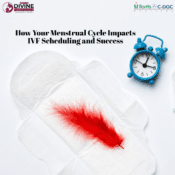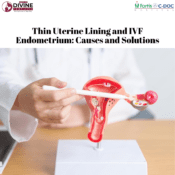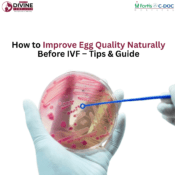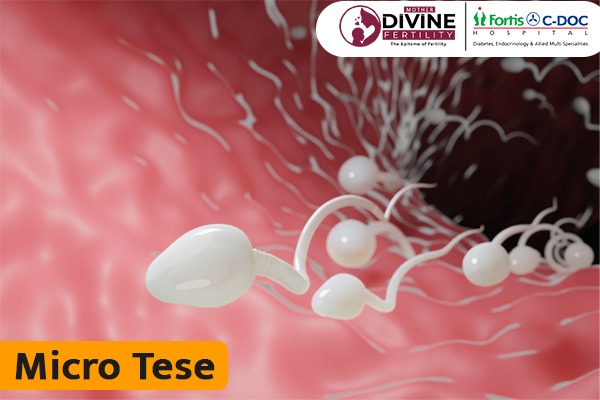

Micro TESE Centre in Delhi
What are the treatments available for Male Infertility?
The treatment of Male Infertility requires personalized approaches that take into account various factors, such as the duration of married life, the presence of coital problems, the wife's reports (whether they are normal or not), the severity of abnormal semen analysis results, the age of the couple, and the duration of infertility. At Divine Fertility, a reputable and transparent IVF Centre in Delhi, several effective treatment options are available, including:
1.Antioxidant tablets or sachets
2.Clomiphene citrate
3.Injectable hormones (HMG, FSH) for Azoospermia or severe oligospermia, where HMG plays a crucial role in treating Hypogonadotropic Hypogonadism.
4.Varicocele repair surgery
5.ICSI (Intracytoplasmic Sperm Injection) for oligospermia
6.MESA (Microsurgical Epididymal Sperm Aspiration) or PESA (Per-cutaneous Epididymal Sperm Aspiration) for OBSTRUCTIVE AZOOSPERMIA
7.TESA (Testicular Sperm Aspiration) or micro TESE (Micro Testicular Sperm Extraction) for Non-obstructive Azoospermia
8.Testicular sperm mapping
9.Electroejaculation and vibro ejaculation for patients with ejaculatory disorders
10.Sperm freezing
11.IMSI (Intracytoplasmic Morphologically Selected Sperm Injection) or PICSI (Physiological Intracytoplasmic Sperm Injection)
By tailoring the treatment based on individual needs, Mother Divine Fertility strives to provide the best possible solutions for male infertility.
Micro-TESE
Mother Divine Fertility, renowned as one of India's best IVF center, stands out for its exceptional services, including specialized micro-TESE treatment for patients with zero sperm count. The advent of micro dissection TESE represents a groundbreaking milestone in Male Infertility management, often considered nothing short of miraculous. Remarkably, the micro-TESE procedure boasts the highest success rate in successfully harvesting sperm, even for individuals who previously had no success with a TESA attempt.
For cases of Non-obstructive Azoospermia, micro-TESE is the ultimate and final line of management. The procedure, skillfully performed by experienced surgeons trained in this specialized technique, has provided countless men with the joy of having their own genetic offspring, even after facing disappointments with other methods. In the rare instance where micro-TESE does not yield any sperm, sperm donation remains the only alternative.
Moreover, the sperms extracted through micro-TESE are not only utilized for ICSI, but any excess sperm are also carefully preserved through freezing. This approach ensures that if the need arises in the future, there will be no requirement for a repeat procedure, offering patients peace of mind and convenience. Thanks to the advanced micro-TESE technique, hope is rekindled for those who had previously faced insurmountable challenges in achieving parenthood.
How is micro-TESE done?
Dr. Priyanka Gupta, renowned for her expertise in Andrology and Male Infertility, had the exceptional opportunity to visit and gain knowledge from the world-renowned "Androfert" center in Sao Paulo, Brazil, under the guidance . During the procedure known as micro-TESE, performed under general anesthesia, the testis is surgically opened and examined using a high-powered microscope (40x magnification). Using forceps, areas with dilated, white, and thick tubules are carefully retrieved and sent to the embryology laboratory for sperm presence analysis. The process involves an intensive search until the Embryologist indicates success or until 25-30 tissue samples are examined without yielding any results.
How does micro-TESE give success when a simple TESA has failed?
The testis is a highly dynamic organ capable of continuing sperm production even when some areas are damaged. However, in certain procedures like TESA, where a needle is blindly injected, it becomes challenging to identify these pockets of active sperm production, resulting in potential missed opportunities. Conversely, micro-TESE allows for a thorough examination of the entire testis under magnification, enabling the detection of any areas with active sperm production. Consequently, micro-TESE increases the likelihood of finding viable sperm if present.
What determines success for micro TESE?
Micro TESE is an intricate and highly specialized procedure, requiring exceptional skill and precision. Even among top urologist surgeons, it is not a common technique due to the lack of exposure and technical expertise. However, a skilled surgeon alone is not sufficient for success; an equally proficient Embryologist is essential. The Embryologist meticulously examines every minute tubule of the testis for several hours, identifying the presence of viable sperm and informing the surgeon accordingly. Developing such expertise in embryology is challenging.
Fortunately, at Mother Divine Fertility, extensive experience proves invaluable, setting them apart from other IVF centers in Delhi. While some centers may claim to offer micro-TESE, they might not prioritize using only the patient's sperm, resulting in disappointing outcomes. In contrast, at Mother Divine Fertility, we make every effort to utilize the patient's sperm whenever possible, and we have a high success rate in doing so. Any surplus sperm remaining after the ICSI procedure is carefully preserved through freezing, ensuring that these precious samples are safeguarded as a backup.
Concomitant TESA - Micro-TESE procedure or simultaneous Mapping + M-TESE procedure:
As micro TESE is an invasive procedure, many patients inquire about the possibility of a less invasive approach, such as using a thin needle to check for sperms initially. The idea is that if we find sperm using this method, we can proceed with ICSI, making the entire process simpler. Only if we don't find sperm through the needle procedure, would we then opt for a micro TESE. This approach offers the advantage of potentially avoiding the need for micro TESE if the needle procedure is successful. Additionally, it increases the likelihood of finding sperm.
However, there are some disadvantages to this approach. The primary drawback is that it requires administering general anesthesia for the needle procedure, while TESA is typically performed under local numbing agents. Furthermore, it might take additional time to perform both procedures.
Here's how the combined Mapping + micro TESE approach is carried out:
Step 1 - An advanced testicular mapping is conducted by performing TESA on multiple sites of the testis. The obtained sample is promptly examined for sperm. If sperm are found during this mapping process, the procedure is terminated at this point.
Step 2 - If no sperm are discovered during the testicular mapping, we proceed with the micro TESE procedure.
By utilizing the simultaneous Mapping + micro TESE approach, our patients at Mother Divine Fertility benefit from the highest chance of using their own sperm to achieve parenthood, with the least amount of necessary surgery.
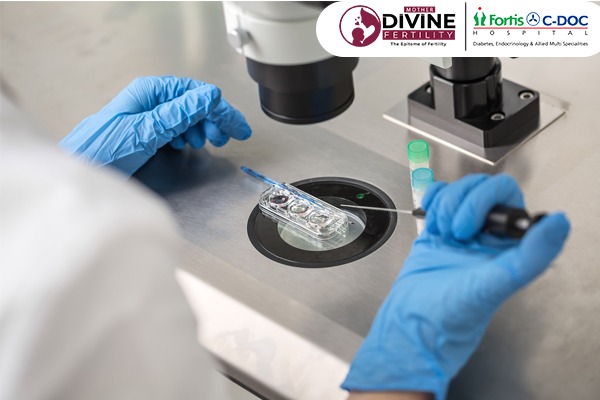

Testicular Sperm Extraction (TESE)
TESE is a simplified version of micro TESE, in which a small incision is made on the testis under local anesthesia, and a tiny tissue sample is sent to the embryology lab. At Mother Divine Fertility, TESE is exclusively performed for patients with OBSTRUCTIVE Azoospermia, meaning they have no issues with sperm production. For patients facing sperm production problems (NON-OBSTRUCTIVE AZOOSPERMIA), micro TESE is strongly recommended, as it offers higher chances of finding viable sperm compared to the standard TESE procedure.
Testicular Sperm Aspiration (TESA)
TESA is a simpler and faster procedure compared to TESE. In TESA, a thin needle is inserted into the testis to aspirate its contents, and the procedure is performed under local anesthesia. TESA is the preferred option when the issue lies with sperm production, such as in cases of Obstructive Azoospermia.
PESA and MESA
Per-cutaneous epididymal sperm aspiration (PESA) and Micro-surgical epididymal sperm aspiration (MESA) are both minor procedures designed to extract sperm in cases of Obstructive Azoospermia. The main advantage of these procedures is that they specifically target the epididymis, a small tube located behind the testis that serves as the pathway for sperm. This allows the testis to remain untouched during the extraction process. However, it is important to note that PESA or MESA cannot be performed in cases where there is a problem with sperm production. In such instances, alternative approaches would be necessary to address the root cause of the issue.
Conclusion
Mother Divine Fertility Centre in Delhi offers state-of-the-art fertility solutions, including the advanced Microscopic Testicular Sperm Extraction (Micro TESE) procedure. Micro TESE has transformed the landscape of male factor infertility treatment, providing hope to couples who previously had limited options for biological parenthood. With its high success rates and minimal invasiveness, Micro TESE stands as a beacon of hope for couples facing challenges in conceiving a child naturally. The skilled team of reproductive urologists and fertility experts at Mother Divine Fertility Centre ensure that patients receive personalized care and support throughout their fertility journey, making the dream of parenthood a reality for many.

